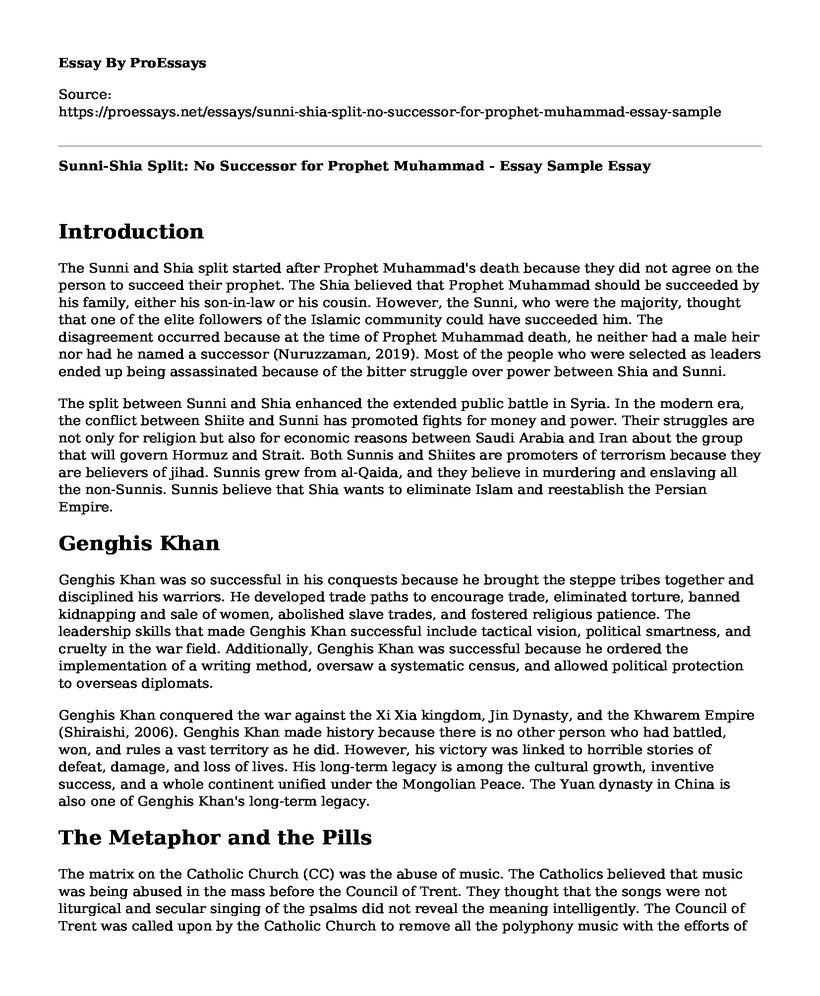Introduction
The Sunni and Shia split started after Prophet Muhammad's death because they did not agree on the person to succeed their prophet. The Shia believed that Prophet Muhammad should be succeeded by his family, either his son-in-law or his cousin. However, the Sunni, who were the majority, thought that one of the elite followers of the Islamic community could have succeeded him. The disagreement occurred because at the time of Prophet Muhammad death, he neither had a male heir nor had he named a successor (Nuruzzaman, 2019). Most of the people who were selected as leaders ended up being assassinated because of the bitter struggle over power between Shia and Sunni.
The split between Sunni and Shia enhanced the extended public battle in Syria. In the modern era, the conflict between Shiite and Sunni has promoted fights for money and power. Their struggles are not only for religion but also for economic reasons between Saudi Arabia and Iran about the group that will govern Hormuz and Strait. Both Sunnis and Shiites are promoters of terrorism because they are believers of jihad. Sunnis grew from al-Qaida, and they believe in murdering and enslaving all the non-Sunnis. Sunnis believe that Shia wants to eliminate Islam and reestablish the Persian Empire.
Genghis Khan
Genghis Khan was so successful in his conquests because he brought the steppe tribes together and disciplined his warriors. He developed trade paths to encourage trade, eliminated torture, banned kidnapping and sale of women, abolished slave trades, and fostered religious patience. The leadership skills that made Genghis Khan successful include tactical vision, political smartness, and cruelty in the war field. Additionally, Genghis Khan was successful because he ordered the implementation of a writing method, oversaw a systematic census, and allowed political protection to overseas diplomats.
Genghis Khan conquered the war against the Xi Xia kingdom, Jin Dynasty, and the Khwarem Empire (Shiraishi, 2006). Genghis Khan made history because there is no other person who had battled, won, and rules a vast territory as he did. However, his victory was linked to horrible stories of defeat, damage, and loss of lives. His long-term legacy is among the cultural growth, inventive success, and a whole continent unified under the Mongolian Peace. The Yuan dynasty in China is also one of Genghis Khan's long-term legacy.
The Metaphor and the Pills
The matrix on the Catholic Church (CC) was the abuse of music. The Catholics believed that music was being abused in the mass before the Council of Trent. They thought that the songs were not liturgical and secular singing of the psalms did not reveal the meaning intelligently. The Council of Trent was called upon by the Catholic Church to remove all the polyphony music with the efforts of restoring the sacredness of the church (Slivka, 2012).
The two pills that are of the most significant are the red pill and the blue pill. The red pill provides harsh knowledge and the brutal reality, while the blue pill makes people live in the comfort of the world, peaceful happiness, and ignore the cruel truth of life. The red fact symbolizes that it is difficult to accept reality because it hurts in most cases; therefore, people prefer being ignorant to avoid the harshness. Neo, in the fiction movie, Matrix decided to swallow the red pill and was warned that it would not be easy to know the truth. He experienced a lot of hallucinations, which was the reality of his original life.
References
Nuruzzaman, M. (2019). Contemporary Shia-Sunni Sectarian Violence. International Relations. DOI: 10.1093/obo/9780199743292-0249
Shiraishi, N. (2006). Avraga Site: The Great Ordu of Genghis Khan. Beyond the Legacy of Genghis Khan. DOI: 10.1163/9789047418573_008
Slivka, D. (2012). Reformation versus the Council of Trent and Rules for Interpretation from 16th to 19th. E-Theologos. Theological Revue of Greek Catholic Theological Faculty, 3(1), 28-37. DOI: 10.2478/v10154-012-0003-z
Cite this page
Sunni-Shia Split: No Successor for Prophet Muhammad - Essay Sample. (2023, Mar 16). Retrieved from https://proessays.net/essays/sunni-shia-split-no-successor-for-prophet-muhammad-essay-sample
If you are the original author of this essay and no longer wish to have it published on the ProEssays website, please click below to request its removal:
- Beto O'Rourke Biographical Essay
- Assassination of Martin Luther King Jr Essay
- Not for Sale: The Return of the Global Slave Trade and How We Can Fight It
- Essay Sample on Lasting Effects of Slavery in Gyasi's Book
- Understanding Social Theory: Explaining Human Interactions & Forming Hypotheses - Essay Sample
- Essay Sample on European Colonization of Tropical Africa: Factors of Ease and Hardship
- Paper Sample on Yemen: World's Worst Humanitarian Crisis of the Decade







